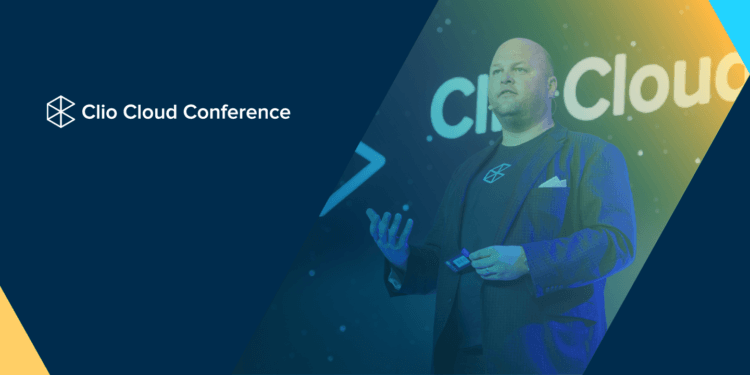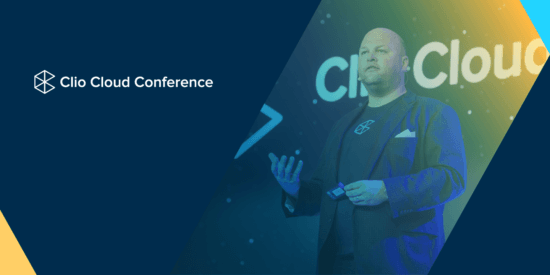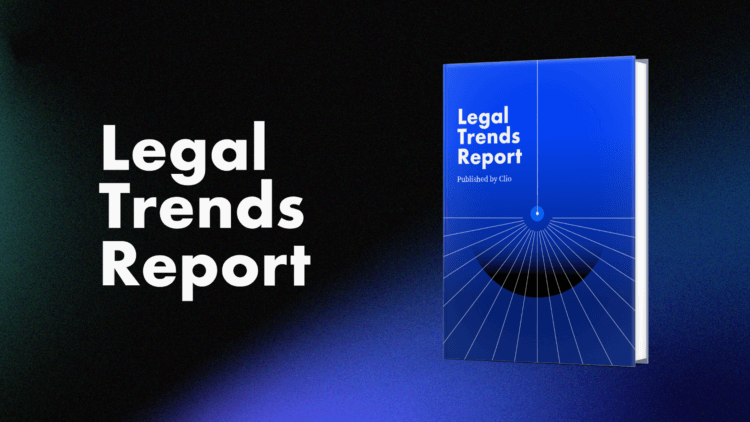Jack Newton, CEO and Co-Founder of Clio, started off the 5th-annual Clio Cloud Conference with his traditional selfie. Then he took us back to Clio’s humble beginnings nine years ago, when he and Rian started the company with a mission to “move the practice of law to the cloud.”
Since then, Clio has grown to include more than 240 employees working across four offices worldwide. In the past near-decade, Clio’s mission has also evolved:
We’re framing things in a slightly different, more revolutionary way. We see our mission as transforming the practice of law, for good.
We want transforming the practice of law to be our collective dent in the universe. We also want to make the practice of law better—making lawyers happier, making their clients happier, making the delivery of legal services easier, and hopefully increasing access to justice by accomplishing all of this.
This is our new vision, something we plan on accomplishing over the next decade. I think we’ve made meaningful progress on this already, but we’re just getting started.
Clio’s data-driven approach
Jack spoke about what we can learn from looking at the billions of data points analyzed and reported on in the 2017 Legal Trends Report, and how the story has stayed largely the same from last year’s report: Lawyers only work 2.3 hours worth of billable time each day—which begs the question, “Where do the remaining 6 hours go?”
We realized the Legal Trends Report was just the tip of the iceberg. The data we were looking at through Clio gave us a lens into what was happening, but it didn’t let us understand where the time was going.
To better learn how lawyers were spending their time, Clio conducted a brand-new survey of legal professionals, including both Clio users and non-Clio users. In looking at data from nearly 3,000 survey responses, this year’s report shows that the bulk of non-billable time is being taken up by two key factors:
- Lawyers are being bogged down in non-billable administrative work.
- Lawyers need more clients.
In this year’s report, Clio also surveyed more than 2,002 consumers, giving us surprising insights into what influences clients in their decision to hire a lawyer.
In this consumer survey, we’re asking questions to basically understand what consumers are looking for in lawyers. We’re going to help bridge the gap between lawyers delivering services the way they think consumers want them, and consumers who know how they want to get their legal services.
Read the 2017 Legal Trends Report
Working toward effortless customer experiences
At the heart of Jack’s keynote was an emphasis on pushing law firms to be obsessively client-focused, something he strives for with Clio every day.
If we look at the companies that have really redefined their spaces—companies like Uber, AirBNB, and Amazon—they have achieved their level of disruption through creating effortless experiences for their consumers.
Thinking about effortless experiences doesn’t always mean thinking in grandiose transformational ways. Sometimes it means making simple, tactical changes that can have outsized impact.
To give an example, my kids set up a lemonade stand to raise money for charity this summer. To help them with the entrepreneurial skills, I helped them pick a great location and bought them a Square reader to process credit cards. Through lemonade alone, we raised more than $500 in less than three hours, and more than half of our transactions were done by credit card. The question I have for law firms is, why is a lemonade stand run by three kids more flexible in the way they accept payments than most law firms?
You may like these posts
Reinventing Clio, from the ground up
As promised from last year’s conference, the biggest highlight of Jack’s presentation was the unveiling of a complete, ground-up reinvention of Clio.
Redesign doesn’t really do justice to what we accomplished with the new Clio. We took apart Clio and rebuilt it from the foundation to make sweeping changes and improvements. It’s hard to get across what we’ve accomplished with the scope of the new Clio experience. You really need to experience it hands-on.
As part of the new Clio experience, Clio’s interface puts more of what matters most to Clio users closer to their fingertips—increasing information density, so that you can see more on any given screen, without making it overwhelming.
In total, we’ve made over 220 improvements to Clio, and these are just a few that only scratch the surface:
- Sidebar navigation. We’ve moved the navigation into a collapsible sidebar, which makes better use of the screen and offers more room to build out features over time.
- Timekeeper. The new Timekeeper has been redesigned so that it’s readily available. Start and stop the timer from any page with one click, and apply time to any new or existing Matter.
- Payment dashboard. We’ve consolidated what has been spread out across many screens into one single dashboard, and implemented the ability to receive payment for multiple bills with just a few clicks.
- Search. We’ve created a completely new user experience for searching information in Clio. The new search is over 20 times faster, while being more comprehensive.
The new Clio experience is faster than ever before.
The most comprehensive platform in the legal space
Jack also highlighted that the Clio platform now includes over 70 integration partners, an ecosystem of companies that will help fully move the practice of law to the cloud. To push this even further, Jack announced API v4.
API v4 is a brand new version of our API that allows you to build your own tools and products on top of Clio. If it can be done in Clio, it can be done via the API, which is big news for our integration partners and anyone who wants to build on the Clio platform.
To encourage innovation in the legal tech space, Jack also announced two major funding initiatives:
- Launch//Code contest. To encourage new technology in the legal industry, Clio is hosting a contest for the best new integration built for the Clio platform. The winning company or business will receive the $100,000 prize at next year’s Clio Cloud Conference.
- Clio Developer Fund. Clio is also launching a $1 million developer fund—a groundbreaking event supporting the future of technology in the legal industry.
A thriving ecosystem on Clio is an unbelievably good thing. It is means that legal innovation will happen first on Clio.
Looking at the next ten years
With what we’ve done over the past year, from the Legal Trends Report to Clio’s newest reinvention, and to what we have planned for the coming year, we hope to lay the foundation for what the legal industry will look like in the next ten years.
We’re incredibly excited to share these developments with you today, and we look forward to your feedback and collaboration in the coming future.
Watch the full keynote
We published this blog post in September 2017. Last updated: .
Categorized in: Clio
Free On-Demand Webinar - Watch How Law Firms Use Clio
Watch this walk-through to see why over 150,000 legal professionals use Clio’s leading cloud-based legal software.
Watch now








